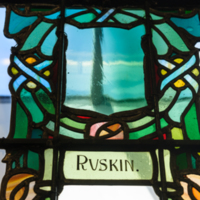Ruskin
Dublin Core
Title
Ruskin
Description
John Ruskin is mainly known for his magnificent work in the fields of art, literature and architecture. A fervent art critic, Ruskin is also remembered for his ideas on socialism and immense contribution towards promoting Gothic architecture. He gained popularity as a social critic and a poet in the Victorian and Edwardian eras. He was born on February 8, 1819 in London. Rebelling against classical styles, John Ruskin reawakened British interest in heavy, elaborate Gothic architecture. He also disdained anything machine-made, and paved the way for the reformist Arts & Crafts movement. His multivolume Modern Painters (1843-60), planned as a defense of painter J.M.W. Turner, expanded to become a general survey of art. His other writings include The Seven Lamps of Architecture (1849) and The Stones of Venice (1851-53). He also defended the Pre-Raphaelites. In 1869 he was elected Oxford's first Slade professor of fine art; he resigned in 1879. He died on January 20, 1900 at Brantwood by Coniston Water in the Lake District at the age of 80.
Files
Citation
“Ruskin,” Pages of Weston History: 100 Years and Beyond, accessed April 28, 2024, http://omeka.tplcs.ca/omeka_weston/items/show/1248.


